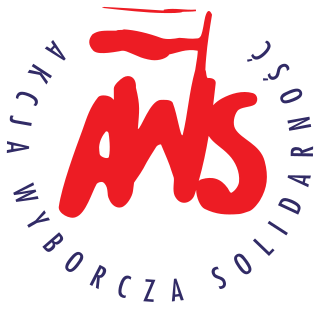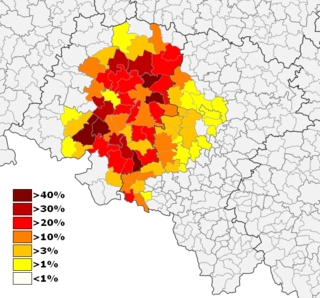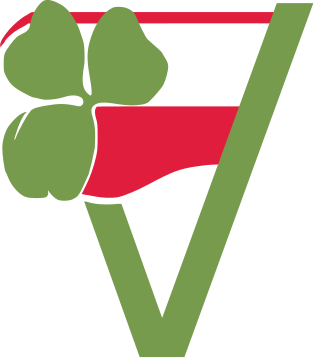 |
|---|
The Party of Christian Democrats (Polish : Partia Chrześcijańskich Demokratów, PChD) was a political party in Poland.
 |
|---|
The Party of Christian Democrats (Polish : Partia Chrześcijańskich Demokratów, PChD) was a political party in Poland.
The PChD was established in Poznań on 16 December 1990 by members of the Solidarity trade union and its political arm, the Solidarity Citizens' Committee. [1] Its founding congress was held on 13 January 1991, with Krzysztof Pawłowski becoming party chairman and Paweł Łączkowski being appointed secretary general. In the 1991 parliamentary elections it received 1.1% of the vote, winning four seats in the Sejm and three in the Senate. [2]
The party joined forces with the Christian National Union for the 1993 parliamentary elections, which they contested as the Catholic Electoral Committee "Homeland" but failed to win a seat. [2] In 1996 the party joined the centre-right Solidarity Electoral Action, which went on to win the 1997 parliamentary elections, with PChD taking seven of the alliance's 201 seats.
In July 1999 an agreement was reached with the leader of Movement for the Republic to merge to form a new party. The Polish Christian Democratic Agreement was subsequently established the following September.
| Term | Sejm members | Senate members |
|---|---|---|
| 1991–1993 | Anna Knysok, Wiesław Klisiewicz, Paweł Łączkowski, Janusz Steinhoff | Jarosław Barańczak, Tadeusz Kamiński, Krzysztof Pawłowski |
| 1997–2001 | Paweł Łączkowski, Janusz Steinhoff, Franciszek Adamczyk, Andrzej Brzeski, Tadeusz Maćkała, Kazimierz Poznański, Maciej Rudnicki |

Solidarity Electoral Action was a coalition of political parties in Poland, active from 1996 to 2001. AWS was the political arm of the Solidarity trade union, whose leader Lech Wałęsa, was President of Poland from 1990 to 1995, and the successor of the parties emerged from the fragmentation of the Solidarity Citizens' Committee.
From 1989 through 1991, Poland engaged in a democratic transition which put an end to the Polish People's Republic and led to the foundation of a democratic government, known as the Third Polish Republic, following the First and Second Polish Republic. After ten years of democratic consolidation, Poland joined NATO in 1999 and the European Union on 1 May 2004.

The Real Politics Union is a national conservative and economically liberal political party in Poland. In the past it was right-libertarian and classical liberal.

The Conservative People's Party was a liberal-conservative and Christian-democratic political party in Poland, which was active in 1997–2003 and 2007–2014. In 2014, the party was incorporated into Poland Together.

Parliamentary elections were held in Poland on 27 October 1991 to elect deputies to both houses of the National Assembly. The 1991 election was notable on several counts. It was the first parliamentary election to be held since the formation of the Third Republic, the first entirely free and competitive legislative election since the fall of communism, the first completely free legislative election of any sort since 1928. Due to the collapse of the Solidarity political wing, the Solidarity Citizens' Committee, the 1991 election saw deep political fragmentation, with a multitude of new parties and alliances emerging in its wake. Low voting thresholds within individual constituencies, along with a five percent national threshold allocated to a small portion of the Sejm, additionally contributed to party fragmentation. As a result, 29 political parties gained entry into the Sejm and 22 in the Senate, with no party holding a decisive majority. Two months of intense coalition negotiations followed, with Jan Olszewski of the Centre Agreement forming a minority government along with the Christian National Union, remnants of the broader Centre Civic Alliance, and the Peasants' Agreement, with conditional support from Polish People's Party, Solidarity list and other minor parties.

Contract Sejm is a term commonly applied to the Sejm ("parliament") elected in the Polish parliamentary elections of 1989. The contract refers to an agreement reached by the Polish United Workers' Party and the Solidarność ("solidarity") movement during the Polish Round Table Agreement. The final agreement was signed on April 5, 1989. As a result, real political power was vested in a newly created bicameral legislature and in a president who would be the chief executive. Solidarność became a legitimate and legal political party.

Marian Krzaklewski is a Polish politician. A member of Solidarity since the 1980s, he was one of the most known and influential Polish politicians in the late 1990s, when he created the Solidarity Electoral Action (AWS). The AWS coalition, especially when it joined forces with Freedom Union, was a major accomplishment in Polish politics, transforming the fragmented post-Solidarity camp into a powerful political force.

The Centre Agreement was a Christian-democratic political party in Poland. It was established in 1990 and had its roots in the Solidarity trade union and its political arm, the Solidarity Citizens' Committee. Its main leader was Jarosław Kaczyński. The party was initially the party of choice of Polish president Lech Wałęsa and heavily cooperated with him and his environment between 1990 and 1992, leading the first post-communist governments. In 1991, Jan Olszewski from Centre Agreement gained the support of Wałęsa for his candidacy for Prime Minister, forming a PC-led government. However, the government was mired with internal conflicts in 1992 and fell to a vote of no confidence. Afterwards, the party was increasingly marginalized and became a part of Solidarity Electoral Action in 1997. In 1999, the bigger faction of the party left to the newly created Polish Christian Democratic Agreement; further, in 2001, the leadership of the party dissolved Centre Agreement to found Law and Justice, the direct successor of the party. However, it wouldn't be until a year later that it would dissolve.

Solidarity, a Polish non-governmental trade union, was founded on August 14, 1980, at the Lenin Shipyards by Lech Wałęsa and others. In the early 1980s, it became the first independent labor union in a Soviet-bloc country. Solidarity gave rise to a broad, non-violent, anti-Communist social movement that, at its height, claimed some 9.4 million members. It is considered to have contributed greatly to the Fall of Communism.

The Center Civic Alliance, abbreviated as POC, was a center-right electoral alliance of several political parties that participated in the 1991 Polish parliamentary election. The Center Civic Alliance was chiefly organized by the Centre Agreement, drawing in remnants of the Solidarity Citizens' Committees, independents, and Christian right parties, including the Polish People's Christian Forum "Fatherland". The alliance was created after its main component, the Centre Agreement, attempted to form a broad alliance supporting President Lech Wałęsa. However, the alliance quickly fell out of favor with the president, failing to gain Wałęsa's approval. In its aftermath, Centre Agreement leader Jarosław Kaczyński was subsequently fired from his position as Chief of the Presidential Chancellery.

National Party of Retirees and Pensioners is a minor left-wing political party in Poland. The main goal of KPEiR is protecting retired seniors, pensioners and trust-busting. The current leader is former Sejm Member Tomasz Mamiński.
The Christian National Union was a Christian-democratic and nationalist political party in Poland. Established on 15 September 1989, the party traced its tradition to the Solidarity movement, as well as pre-World War II National Democracy and Polish Christian Democratic Party. The party adhered to the Christian right, advocating social conservatism. From its foundation until 1994, the party was led by Wiesław Chrzanowski, who was Marshal of the Sejm in 1991–1993.

The German Minority Electoral Committee is an electoral committee in Poland which represents the German minority. Since 2008, its representative has been Ryszard Galla. In the 2023 Polish parliamentary election, Galla lost his seat in the Sejm, leaving the party with no national representation.

The Polish People's Party – Peasants' Agreement, commonly known simply as Peasants' Agreement (PL), was an agrarian and Christian-democratic political party in Poland.

The Labour Party is a minor political party in Poland. It was formally called the Christian-Democratic Labour Party(Polish: Chrześcijańsko-Demokratyczne Stronnictwo Pracy, ChDSP) between 1989 and 2000. The party continued the traditions of the pre-war Labor Party, which ceased its activities in Poland in 1946. This made the party be considered a historical formation, together with the Polish Socialist Party.
The Party of Polish Democracy was a political party in Poland.
The Social Movement was a Christian-democratic political party in Poland.

The Catholic Electoral Committee "Fatherland" was a conservative and Christian democratic electoral alliance in Poland. It consisted of five parties - the Christian National Union (ZChN), Conservative Party (PK), Christian-Peasant Party (SLCh), Party of Christian Democrats (PChD) and the Federation of Polish Entrepreneurship (FPP).

The Polish Union, also known as the Regional Agreement RdR in 1993, was a Christian-democratic centre-right political party in Poland. The party was founded by defectors from Polish Christian-democratic party Movement for the Republic, who left the party over the dispute regarding forming a possible coalition with Centre Agreement, the party that Movement for the Republic was itself a split from. Shortly after being formed, the Polish Union announced an electoral union with the Centre Agreement in June 1993, known as Centre Agreement – Polish Union.
The Centre Agreement – Integrative Initiative was a Christian-democratic political party in Poland. It was founded by the former secretary and member of the executive board of Centre Agreement (PC) Wojciech Dobrzyński, who was stripped of his functions on 5 October 1994, and then expelled from the party by Jarosław Kaczyński in January 1995. Kaczyński expelled Dobrzyński over his willigness to cooperate with the right-wing Christian National Union, a party that wanted to create an All-Polish electoral alliance that would unite all right-leaning parties in Poland but exclude the PC.